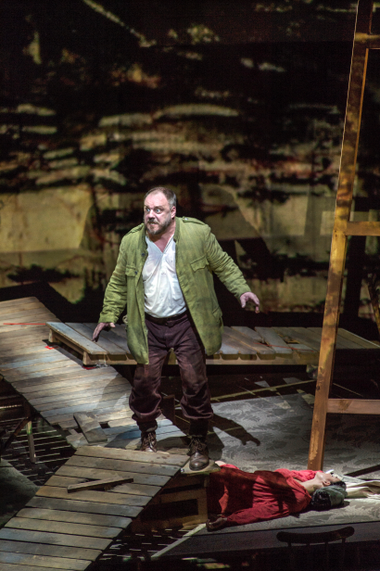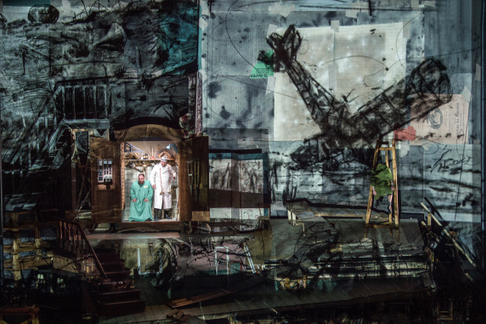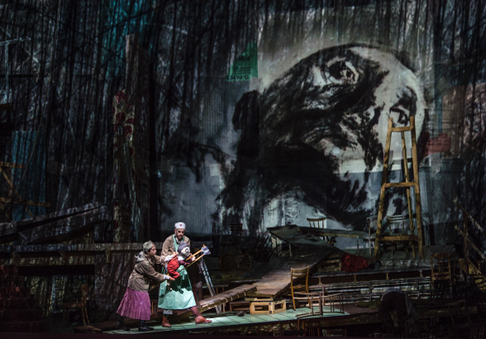Recently in Reviews
English Touring Opera are delighted to announce a season of lyric monodramas to tour nationally from October to December. The season features music for solo singer and piano by Argento, Britten, Tippett and Shostakovich with a bold and inventive approach to making opera during social distancing.
This tenth of ten Live from London concerts was in fact a recorded live performance from California. It was no less enjoyable for that, and it was also uplifting to learn that this wasn’t in fact the ‘last’ LfL event that we will be able to enjoy, courtesy of VOCES8 and their fellow vocal ensembles (more below …).
Ever since Wigmore Hall announced their superb series of autumn concerts, all streamed live and available free of charge, I’d been looking forward to this song recital by Ian Bostridge and Imogen Cooper.
The Sixteen continues its exploration of Henry Purcell’s Welcome Songs for Charles II. As with Robert King’s pioneering Purcell series begun over thirty years ago for Hyperion, Harry Christophers is recording two Welcome Songs per disc.
Although Stile Antico’s programme article for their Live from London recital introduced their selection from the many treasures of the English Renaissance in the context of the theological debates and upheavals of the Tudor and Elizabethan years, their performance was more evocative of private chamber music than of public liturgy.
In February this year, Albanian soprano Ermonela Jaho made a highly lauded debut recital at Wigmore Hall - a concert which both celebrated Opera Rara’s 50th anniversary and honoured the career of the Italian soprano Rosina Storchio (1872-1945), the star of verismo who created the title roles in Leoncavallo’s La bohème and Zazà, Mascagni’s Lodoletta and Puccini’s Madama Butterfly.
Evidently, face masks don’t stifle appreciative “Bravo!”s. And, reducing audience numbers doesn’t lower the volume of such acclamations. For, the audience at Wigmore Hall gave soprano Elizabeth Llewellyn and pianist Simon Lepper a greatly deserved warm reception and hearty response following this lunchtime recital of late-Romantic song.
Collapsology. Or, perhaps we should use the French word ‘Collapsologie’ because this is a transdisciplinary idea pretty much advocated by a series of French theorists - and apparently, mostly French theorists. It in essence focuses on the imminent collapse of modern society and all its layers - a series of escalating crises on a global scale: environmental, economic, geopolitical, governmental; the list is extensive.
For this week’s Live from London vocal recital we moved from the home of VOCES8, St Anne and St Agnes in the City of London, to Kings Place, where The Sixteen - who have been associate artists at the venue for some time - presented a programme of music and words bound together by the theme of ‘reflection’.
'Such is your divine Disposation that both you excellently understand, and royally entertaine the Exercise of Musicke.’
Amongst an avalanche of new Mahler recordings appearing at the moment (Das Lied von der Erde seems to be the most favoured, with three) this 1991 Mahler Second from the 2nd Kassel MahlerFest is one of the more interesting releases.
‘And there was war in heaven: Michael and his angels fought against the dragon; and the dragon fought and his angels, And prevailed not; neither was their place found any more in heaven … that old serpent … Satan, which deceiveth the whole world: he was cast out into the earth, and his angels were cast out with him.’
If there is one myth, it seems believed by some people today, that probably needs shattering it is that post-war recordings or performances of Wagner operas were always of exceptional quality. This 1949 Hamburg Tristan und Isolde is one of those recordings - though quite who is to blame for its many problems takes quite some unearthing.
There was never any doubt that the fifth of the twelve Met Stars Live in Concert broadcasts was going to be a palpably intense and vivid event, as well as a musically stunning and theatrically enervating experience.
‘Love’ was the theme for this Live from London performance by Apollo5. Given the complexity and diversity of that human emotion, and Apollo5’s reputation for versatility and diverse repertoire, ranging from Renaissance choral music to jazz, from contemporary classical works to popular song, it was no surprise that their programme spanned 500 years and several musical styles.
The Academy of St Martin in the Fields have titled their autumn series of eight concerts - which are taking place at 5pm and 7.30pm on two Saturdays each month at their home venue in Trafalgar Square, and being filmed for streaming the following Thursday - ‘re:connect’.
The London Symphony Orchestra opened their Autumn 2020 season with a homage to Oliver Knussen, who died at the age of 66 in July 2018. The programme traced a national musical lineage through the twentieth century, from Britten to Knussen, on to Mark-Anthony Turnage, and entwining the LSO and Rattle too.
With the Live from London digital vocal festival entering the second half of the series, the festival’s host, VOCES8, returned to their home at St Annes and St Agnes in the City of London to present a sequence of ‘Choral Dances’ - vocal music inspired by dance, embracing diverse genres from the Renaissance madrigal to swing jazz.
Just a few unison string wriggles from the opening of Mozart’s overture to Le nozze di Figaro are enough to make any opera-lover perch on the edge of their seat, in excited anticipation of the drama in music to come, so there could be no other curtain-raiser for this Gala Concert at the Royal Opera House, the latest instalment from ‘their House’ to ‘our houses’.
"Before the ending of the day, creator of all things, we pray that, with your accustomed mercy, you may watch over us."
Reviews

28 Aug 2017
Wozzeck at the Salzburg Festival
South African actor, artist, multimedia artist, film and theater, now opera director William Kentridge has taken the world by storm over the past few years. In my experience The Magic Flute in Brussels, The Return of Ulysses (puppets) in San Francisco, The Nose in Aix, Lulu at the Met, Die Winterreise and his “One Man Show” in Aix. And now Wozzeck at the Salzburg Festival.
And there’s more recent stuff, much more, mostly multi channel video and sound installations around the world that I won’t see
All of Mr. Kentridge’s disciplines come into play in his opera productions, providing this prolific artist a rich palate of expressive tools. Though basically it’s abstract black lines, and silhouettes, symbolic images, and fragmented squares (still or moving images or playing areas) on a stage face plane that is his hyperbolic canvas. It is one dimensional.
Given Mr. Kentridge’s prestige he works with only the most prestigious, i.e. rich opera companies, thus his productions are supplied with first rank artists, conductors and orchestras, and the most expert technical assistance.
 Matthias Goerne as Wozzeck, Jens Larsen as the Doktor
Matthias Goerne as Wozzeck, Jens Larsen as the Doktor
Of his operatic oeuvre, Wozzeck is his masterpiece, the precision of the opera’s focus, and the velocity of dénouement make quick and pointed use of his techniques. We had little time to tire of them, and given the subject matter they were not trite. It was an artistic success of image to music.
The program booklet informed us that Berg’s Wozzeck was born of the first world war, and composed in the shadows of its human devastation, thus the most powerful of the progression of projected images that captivated our interest (while Buchner’s tragedy unfolded below) was a huge WWI gas mask (not shown in photos).
This Wozzeck therefore did not dwell on the accumulation of the heady human tragedies of Wozzeck, Marie and the Child, but on the plethora of Kentridge images that flowed to the accompaniment of baritone Matthias Goerne’s smooth, art-song style delivery of Wozzeck’s deceptions and delirium. Mr. Goerne in fact was the surrogate William Kentridge in this production — Mr Kentridge himself is always a central feature in his stagings.
 A super, the puppeteer and puppet of the child in gas mask
A super, the puppeteer and puppet of the child in gas mask
Of very great effect was the Child represented by a puppet, an image laden with metaphoric, if hackneyed possibilities. Though in addition to dehumanizing the human expressionism of Berg’s domestic tragedy the puppet troubled us greatly. Puppets don’t sing, so who was going to sing the “hop hops" of the final image?
No one did, they were played by mallets in the orchestra, the words projected on the supertitle screen.
The putrid physical and human atmospheres of Berg’s opera were smoothed over by the flow of images. This same flow obliterated the independence of scenes, the accumulation of which generally lead to the overwhelming effect of Marie’s murder, Wozzeck’s suicide and the Child’s isolation.
The Vienna Philharmonic in the pit of the medium sized Haus für Mozart theater brought an overwhelming presence to Berg’s score. But the vaunted orchestral signposts were obliterated by the incessant flow of images. Moments when you ached to sink into Berg’s abstract musico-dramatic world rushed by so quickly you only reacted to them after the fact. Was this the intention of conductor Vladimir Jurowski, or was he a victim of the production?
Michael Milenski
Cast and production information:
Matthias Goerne: Wozzeck; John Daszak: Drum Major; Mauro Peter: Andres; Gerhard Siegel: Captain; Jens Larsen: Doctor;
Tobias Schabel: First Apprentice; Huw Montague Rendall: Second Apprentice; Heinz Göhrig: Madman; Asmik Grigorian: Marie
; Frances Pappas: Margret. Salzburger Festspiele und Theater Kinderchor; Concert Association of the Vienna State Opera Chorus ;
Vienna Philharmonic; Angelika-Prokopp-Sommerakademie der Wiener Philharmoniker. Vladimir Jurowski: Conductor;
William Kentridge: Director; Luc De Wit: Co-Director; Sabine Theunissen: Sets; Greta Goiris: Costumes; Catherine Meyburgh: Video Compositor & Editor; Urs Schönebaum: Lighting
. Haus für Mozart, Salzburg, August 24, 2017.


